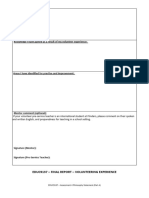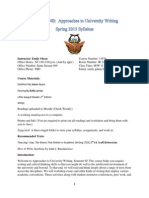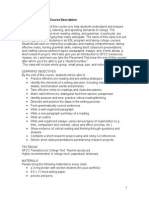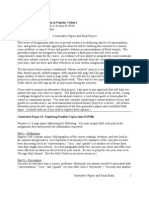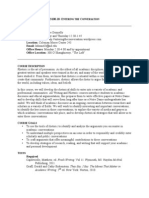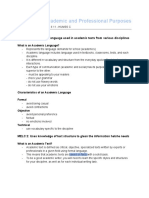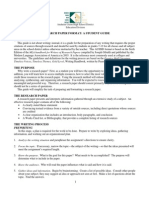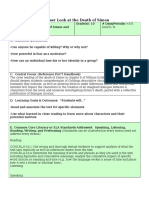ENG 1302: Written Argument and Research Course Syllabus: Spring 2015
ENG 1302: Written Argument and Research Course Syllabus: Spring 2015
Uploaded by
Ali AhmedCopyright:
Available Formats
ENG 1302: Written Argument and Research Course Syllabus: Spring 2015
ENG 1302: Written Argument and Research Course Syllabus: Spring 2015
Uploaded by
Ali AhmedOriginal Description:
Original Title
Copyright
Available Formats
Share this document
Did you find this document useful?
Is this content inappropriate?
Copyright:
Available Formats
ENG 1302: Written Argument and Research Course Syllabus: Spring 2015
ENG 1302: Written Argument and Research Course Syllabus: Spring 2015
Uploaded by
Ali AhmedCopyright:
Available Formats
Spencer English 1302-SPRING 2015
ENG 1302: Written Argument and Research
COURSE SYLLABUS: SPRING 2015
Instructor: Andrew Spencer
Office Location: Hall of Languages 233
Office Hours: TR from 11:00 a.m.-1:00 p.m. or by appointment
Office Phone: (903) 886-5262
Office Fax: (903) 886-5980
University Email Address: aspencer6@leomail.tamuc.edu
PLEASE NOTE: This is a common syllabus used by all graduate students teaching sections of this course.
COURSE INFORMATION
Course Description:
This course provides students with advanced training in communication skills emphasizing the writing and
reading of argumentative prose and adapting writing to alternate audiences. Students will write weekly,
including such texts as journals, reading response logs, summaries of argumentative texts, argumentative
papers, and longer papers integrating secondary research activities include close reading of sample texts,
both student and professional. Some sections will emphasize special topics in both reading and writing.
Prerequisite English 1301 or advanced placement or CLEP.
Student Learning Outcomes:
1.Students will be able to recognize their own subject position, follow the arguments of others, and interpret
data.
2. Student communication will be clear, purposeful, and make appropriate use of evidence, data and
technology as applicable.
3.Students will consider different points of view, work effectively with others despite differences, and
understand the juncture between leadership and cooperation.
4.Student will understand and practice academic honesty.
Core Objectives (Language, Philosophy & Culture):
Critical Thinking Skills: Students will be able to recognize their own subject position, follow the arguments of
others, and interpret data.
Communication Skills: Student communication will be clear, purposeful, and make appropriate use of evidence,
data and technology as applicable.
Teamwork: Students will consider different points of view, work effectively with others despite differences, and
understand the juncture between leadership and cooperation.
Social Responsibility: Students will understand and practice academic honesty.
Local learning outcomes:
Critical Thinking Skills: Students will be able to recognize their own subject position, follow the arguments of
others, and interpret data.
This objective will be assessed by an evaluation of at least one essay or researched presentation from each
student.
Spencer English 1302-SPRING 2015
Communication Skills: Student communication will be clear, purposeful, and make appropriate use of evidence,
data and technology as applicable.
This objective will be assessed by an evaluation of at least one essay or researched presentation from each
student.
Teamwork : Students will consider different points of view, work effectively with others despite differences, and
understand the juncture between leadership and cooperation.
This objective will be assessed by an evaluation of at least one essay or researched presentation from each
student. Students will be responsible for reading and giving productive feedback to peers based on
guidelines and/or a rubric provided by the instructor. Students revise work based on feedback received in
peer review from one or more peers.
Social Responsibility: Students will understand and practice academic honesty.
This objective will be assessed by the instructor using a rubric upon each student's successful completion
of at least four major writing assignments.
Materials Textbooks, Readings, Supplementary Readings:
Textbooks and Materials Required:
Adkins, Tabetha. Ethnographic Inquires in Writing. Southlake, Texas: Fountainhead Press, 2010. 978-59871435-7
Sunstein, Bonnie Stone and Elizabeth Chiseri-Strater. FieldWorking: Reading and Writing Research.
Bedford/St. Martin's, 2006. 978-0-312-43841-8
Three-ring binder to keep all graded papers together, since you will need original copies of every writing
assignment which I grade to include in your final research paper.
Thumb drive or other means (dropbox.com account, for example) of storing digital versions of the essays and
other written material you generate (always, always keep a backup of everything you turn in!)
A valid, working email address that you check everyday
Optional Texts:
Resources for Ethnographic Research (asking good interview questions, professional
associations codes of ethics, etc.)
http://www.tamuc.edu/academics/colleges/humanitiesSocialSciencesArts/departments/literatureLan
guages/firstYearWriting/informationForStudents.aspx
The Celebration of Student Writing at Eastern Michigan University
http://www.emich.edu/english/fycomp/celebration/index.htm
Some of our past Celebrations:
http://www.youtube.com/watch?v=cMWkdAzGYvw
http://www.youtube.com/watch?v=3r0PGbfhHIo
Spencer English 1302-SPRING 2015
COURSE REQUIREMENTS
Instructional / Methods / Activities Assessments
Grading:
You must revise your essays before turning them in as a part of your final paper. When I grade your assignments, I
will provide suggestions for revision. The Writing Center and your peers can also be excellent resources for such
information. Please dont wait until the end of the semester to begin your revisionsyou will not have much time
to work on them while you are completing your ethnography and preparing for your Celebration of Student
Writing presentation.
How Course Grade is Determined:
Writing Assignment 1- Research Proposal (9 Points) (2-3 pages): In this short essay, you should explain to your
instructor where youre going to do your research, what you will be looking for and at in that research site, and
why this site is appropriate for your research. In interest of conducting ethical research, explain your connection
to this site (i.e. you eat lunch there often, you know someone who works there, etc.). Make sure you include the
following:
Explain what ethnographers mean by literacy. Use at least one quote from Chapter 1 of EIIW to help you
explain the complexity of the term.
Explain what a discourse community is, and give examples of how you see all three elements (self-defined
group, common interest, same language or lingo) in the discourse community/research site you have
chosen.
Give at least one example of a literacy practice and a literacy event you might find at your research site/in
your discourse community. Describe the difference between the two terms.
Writing Assignment 2- Informed Consent and Code of Ethics (9 Points): Using The Belmont Report as a frame work
and the Codes of Ethics developed by professional organizations like The Modern Language Association, The
American Anthropological Association, The Association of Internet Researchers, or The American Folklore Society,
create a Code of Ethics you will follow in your own research. You may also find information in EIIW and FW to
assist you with this project. Once you have created your Code of Ethics, you will also need to create an Informed
Consent form that your research participants will read and sign. Remember that your research participants are the
audience for this text, so youll want to create an informed consent sheet that makes sense to them but also follows
the guidelines and expectations of your instructor. (3-4 pages)
Writing Assignment 3- Annotated Bibliography (9 Points): Since good ethnographic research involves both
fieldwork and traditional library research, you will need to gather sources that inform what you learn in your
fieldwork. These sources should be books, peer reviewed journal articles, and other relevant sources approved by
your instructor. Since the research youre doing is scholarly, you will only use scholarly sources to support your
claims. (That means no Wikipedia or Dictionary entries, for example.) You must annotate five items, including
three peer reviewed articles and two other secondary sources.
Writing Assignment 4- Ethnographic Setting Essay (9 Points): In this essay, you will show off your ability to use
descriptive language to paint a picture with words. Your goal is to describe your research site so thoroughly and
completely that readers feel they have been there themselves. This essay will eventually become part of your final
ethnographic essay. (2-3 pages)
Writing Assignment 5- Conclusion (9 Points): Now that you have completed all of the sections of your final paper
(WA1-WA4), it is time to sum up what you have learned. Using all of the literacy terms we have practiced all
semester (I will include them on the writing prompt that I give you) write an essay thoroughly detailing how your
discourse community functions giving examples of each term. Your first paragraph should be an introduction
following the CARS model with a strong thesis sentence. Your next paragraphs should be body paragraphs
Spencer English 1302-SPRING 2015
supporting your point, and the final paragraph should be a conclusion which restates your thesis and sums up your
entire paper
(2-3 pages).
Final Ethnographic Essay (9 Points): A final essay detailing the results of your study, what your findings mean in
relation to the field of literacy studies, etc. Look to chapters four and five in EIIW for what this project should look
like. Please include in one (MLA format) document with section headers:
Research Proposal (WA1)
Code of Ethics (WA2)
Annotated Bibliography (WA3)
Ethnographic Setting Essay (WA4)
Conclusion Research Proposal (WA5)
You must also include your graded copy of these assignments from the first time you handed them in so that I can
check to insure that you made all of the corrections I suggested for the final document.
Celebration of Student Writing (9 Points): Friday, December 5 from 10:00 AM to noon . The Celebration of Student
Writing is an event held every semester where students enrolled in ENG 1302 demonstrate and show-off what they
learned in their research projects. You should create some kind of display with artifacts, visual elements, and
information about what you learned in your research. The celebration will look like a science fair with rows of
tables and projects displayed. Your participation in this event is mandatory. Plan to arrive approximately 20
minutes early to set up.
Attendance (37 Points): Ive designed this class so that you will have to do very little work outside of the classroom.
I will even give you time in class to work on your papers, and when I assign something that cannot be done in class,
I will give you a day off to accomplish it. Consequently, attendance is absolutely necessary to pass this class. The
flip side of that is, if you attend class regularly, you will almost automatically get an A or B in this class.
Grading Points:
9 Points WA 1
9 Points WA 2
9 Points WA 3
9 Points WA 4
9 Points WA 5
9 Points Final Ethnography
9 Points Student Celebration of Writing
37 Points Attendance
= 100 Points
Grading Scale
90-100
89-80
79-70
69-60
59 and below
Spencer English 1302-SPRING 2015
Late Work:
I do not accept late work. All papers are due in class on the date listed below. They should be printed and stapled,
and should use MLA format. I do not accept emailed copies.
I understand that life happens, and if you discover that you simply will not be able to turn in your paper on the due
date, I occasionally grant extensions IF you notify me at least 24 hours in advance. That means if your paper is due
on Wednesday at 12:30 pm, you must ask for an extension by Tuesday at 12:30 pm.
TECHNOLOGY REQUIREMENTS
Flash drive or other means (dropbox.com account, for example) of storing digital versions of the essays
and other written material you generate (always, always keep a backup of everything you turn in!)
A valid, working email address that you check often (everyday)
Regular internet access (additional readings available online)
Access to a computer with a word processing program and a printer (assignments must be typed and
printed)
ACCESS AND NAVIGATION
Some supplementary texts for this course exist exclusively online, so you must have Internet access to read and/or
view these texts.
COMMUNICATION AND SUPPORT
Interaction with Instructor Statement:
Please contact you instructor with any questions you may have. Your instructors communication preference
is e-mail, and her address is: aspencer6@leomail.tamuc.edu . Also, each instructor in the Department of
Literature and Languages is required to keep at least two office hours per course per week.
Grievance Procedure:
If you have concerns about the class or about me as an instructor, please speak to me about those concerns.
If you are not satisfied with the outcome of our conversation, the next person in the chain of command is the
Director of the Writing Program, Dr. Tabetha Adkins. Her e-mail address is Tabetha.Adkins@tamuc.edu.
See grievance procedures here:
http://www.tamuc.edu/academics/colleges/humanitiesSocialSciencesArts/departments/literatureLanguag
es/firstYearWriting/informationForStudents.aspx
COURSE AND UNIVERSITY PROCEDURES/POLICIES
Course Specific Procedures:
Writing Center
Spencer English 1302-SPRING 2015
The Writing Center offers writers free, one-on-one assistance. We welcome all writers, majors, and
disciplinesundergraduate and graduate students alike. In fact, we work from the premise that all writers,
no matter their ability level, benefit from the feedback of knowledgeable readers. The Writing Center staff is
trained to provide writers with just this service. In short, we are here to help you help yourself. In order to
ensure the most effective session possible, we offer visitors the following suggestions: (1) Get started on your
writing project early, and visit the Writing Center at least one day before your final draft is due. You will need
time to work with the ideas and suggestions generated in your tutorial sessions. (2) Bring a written copy of
your assignment, any relevant readings, and one or two specific questions or concerns you would like to
discuss with us.
We are located in the Hall of Languages, Room 103 (903-886-5280) and online at
http://www.tamuc.edu/academics/colleges/humanitiesSocialSciencesArts/departments/literatureLanguag
es/writingCenter/default.aspx
Academic Honesty
The official departmental policy: Instructors in the Department of Literature and Languages do not tolerate
plagiarism and other forms of academic dishonestly. Instructors uphold and support the highest academic
standards, and students are expected to do likewise. Penalties for students guilty of academic dishonesty
include disciplinary probation, suspension, and expulsion. (Texas A&M University-Commerce Code of
Student Conduct 5.b [1,2,3])
If you ever have any questions about a particular use of a source, always ask your instructor. They want you
to avoid plagiarism, too, so they will help you do so whenever and wherever they can. Do what you can to
take advantage of this supportto look innocent in addition to being innocent when it comes to charges of
plagiarism.
Students guilty of academic dishonesty of plagiarism can expect to fail the assignment in question or the
entire course depending on the nature of the incident.
On University-Sanctioned Activities
To accommodate students who participate in university-sanctioned activities, the First-Year Composition
Program offers sections of this course at various times of the day and week. If you think that this course
may conflict with a university-sanctioned activity in which you are involved--athletics, etc.--please see your
instructor after class on the first day.
University Specific Procedures:
Students with Disabilities
The Americans with Disabilities Act (ADA) is a federal anti-discrimination statute that provides
comprehensive civil rights protection for persons with disabilities. Among other things, this legislation
requires that all students with disabilities be guaranteed a learning environment that provides for
reasonable accommodation of their disabilities. If you have a disability requiring an accommodation,
please contact:
Office of Student Disability Resources and Services
Texas A&M University-Commerce
Spencer English 1302-SPRING 2015
Gee Library 132
Phone (903) 886-5150 or (903) 886-5835
Fax (903) 468-8148
StudentDisabilityServices@tamuc.edu
Student Disability Resources & Services
Student Conduct
All students enrolled at the University shall follow the tenets of common decency and
acceptable behavior conducive to a positive learning environment. (See Code of Student
Conduct from Student Guide Handbook).
Spencer English 1302-SPRING 2015
COURSE OUTLINE / CALENDAR
Ethnographic Inquires in Writing = EIIW; FieldWorking = FW
Schedule subject to change (probably will change).
DATE
To Read in Class
To Do in Class
T Jan. 20
Introduction; Icebreaker
R Jan. 22
Discuss syllabus; Share personal
literacy object
T Jan. 27
EIIW Chap. 1 (1-18) (on
website & in book)
In-class writing
My Position; discuss reading
R Jan. 29
Chap. 2 intro in EIIW (19-20)
Literacy Practices EIIW
(21-32)
Discuss readings (literacy
Brandt); Introduce WA 1
T Feb. 3
FW (1-8;14-18)
Discuss reading; in-class activity
(FW 13)
R Fen. 5
Literacy in Three Metaphors
EIIW (35-53).
Discuss reading
T Feb. 10
Write about discourse
community
Peer edit discourse community
draft
R Feb. 12
FW (43-54)
Introduce WA 2; discuss
subcultures (FW 54)
T Feb. 17
FW (23-42)
Discuss sites & reading (discuss
format of ethnography from
reading); introduce field notes
(FW78); sign up for conferences
R Feb.19
T Feb. 24
DUE in class
Write WA1
FW (73-84)
Meet at SRSC (outside
bookstore); Practice
fieldworking
WA 1
Spencer English 1302-SPRING 2015
R Feb. 26
Ethnographic Research
Ethics and Amish Values
EIIW (158-68)
Discuss reading; Informed
Consent
T Mar. 3
The Belmont Report EIIW
(122-39); FW 119-24; Copy
field notes
In-class writing (FW 88-9);
discuss readings (ethics);
introduce WA 2
R Mar. 5
T Mar. 10
Write WA2
Chap. 3 Intro EIIW (117-22)
Online class
R Mar. 12
Online class/1st Site Visit
T Mar. 17
Spring Break! (No class)
R Mar. 19
Spring Break! (NO class)
T Mar. 24
FW 219-29;
R Mar. 26
Discuss reading; introduction to
interviews
FW 165-172; 175-9;
Discuss reading; in-class activity
(FW 168-70); Introduce WA 3
R Apr. 2
FW 111-3; 124-136
Discuss reading; Artifact activity
T Apr. 7
Interviews
Write WA3
FW 186-97; Craft
Observation Guide #2-4
In-class writing (FW 193-4);
discuss reading; peer edit
Observation Guide
T Apr. 14
Write WA4
R Apr. 16
Turn in WA4
T Apr. 21
WA 2
2nd Site Visit (interviews)
T Mar. 31
R Apr. 9
Copy of field
notes
FW 101-110
Discuss reading; in-class activity
(FW 109-10)
R Apr. 23
Discuss Annotated Bib &
Research; Discuss Ethnography
format
T Apr. 28
Write WA5
WA3
WA 4
Spencer English 1302-SPRING 2015
R Apr. 30
Discuss Presentations & Final
Portfolio
WA5
T May 5
Class Presentation of
Ethnographies
Presentation
R May 7
Class Presentations cont.
Final
Ethnography
F May 8
CELEBRATION OF STUDENT
WRITING
T May 12
Finals week no class
R May 14
Finals week no class
Celebration of Student Writing: Friday, May 8 from noon until 2PM in the Field House
Final copy of Ethnographic Essay Due: April 30
The Celebration Presentation serves as your Final Exam. Congratulations on finishing the semester!
You might also like
- Writing About Writing: A College Reader. Elizabeth Wardle & Doug Downs. Bedford STDocument10 pagesWriting About Writing: A College Reader. Elizabeth Wardle & Doug Downs. Bedford STRuelyn DagumNo ratings yet
- LIS Vendor Information - Access 2 & DxI - Oct'22Document65 pagesLIS Vendor Information - Access 2 & DxI - Oct'22shabbir.omcbdNo ratings yet
- Skills Assessment - Student Training: (Answer Key)Document18 pagesSkills Assessment - Student Training: (Answer Key)xo4yxaNo ratings yet
- BG 12 Geeta - Bhakti YogaDocument26 pagesBG 12 Geeta - Bhakti Yogamiddela6503No ratings yet
- ENG 1302-H: Written Argument and Research (Honors) Course Syllabus: Fall 2011Document5 pagesENG 1302-H: Written Argument and Research (Honors) Course Syllabus: Fall 2011cartershannonNo ratings yet
- Assessment 4 - Final ReportDocument3 pagesAssessment 4 - Final Reportlearn.withtaliaNo ratings yet
- English 114b SyllabusDocument8 pagesEnglish 114b Syllabusapi-273550377No ratings yet
- Writing Global Citizenship: Intermediate Composition: Writing ArgumentDocument13 pagesWriting Global Citizenship: Intermediate Composition: Writing Argumentapi-235849253No ratings yet
- Bilingualism Assignment 3 Description & Topics-1Document5 pagesBilingualism Assignment 3 Description & Topics-1jinchiliuNo ratings yet
- Syllabus 3101 Sem I 2011-12Document9 pagesSyllabus 3101 Sem I 2011-12torr4727No ratings yet
- Teaching EnglishDocument7 pagesTeaching EnglishS.ParamNo ratings yet
- SelaQui Guide To ResearchDocument7 pagesSelaQui Guide To ResearchDiges poddarNo ratings yet
- ESL TRANSITIONS: Course DescriptionDocument5 pagesESL TRANSITIONS: Course Descriptionʚϊɞ Sarah Omar ʚϊɞNo ratings yet
- Slaughterhouse-Five Learning SegmentDocument20 pagesSlaughterhouse-Five Learning Segmentapi-316626434No ratings yet
- 744F17 ResearchDocument4 pages744F17 ResearchTe Wei HuangNo ratings yet
- Generative Papers AssignmentDocument4 pagesGenerative Papers AssignmentCierra Olivia Thomas-WilliamsNo ratings yet
- Engl 150 Syllabus NewDocument12 pagesEngl 150 Syllabus Newkevin60091No ratings yet
- Assignment 5 - Documented Argument About A PlaceDocument3 pagesAssignment 5 - Documented Argument About A PlaceLondie T. MartinNo ratings yet
- 363 SPR 2016 SyllabusDocument7 pages363 SPR 2016 Syllabusapi-220732622No ratings yet
- SANTI WRITING 2021 Informational-Essay-Creating-An-Outline-For-A-DraftDocument13 pagesSANTI WRITING 2021 Informational-Essay-Creating-An-Outline-For-A-DraftmariainesboniverNo ratings yet
- Second Semester Freshman English English 1302 Composition 2 Fall, 2020 (Credit Hours 3)Document10 pagesSecond Semester Freshman English English 1302 Composition 2 Fall, 2020 (Credit Hours 3)Ainsley HyltonNo ratings yet
- Unit Plan Template 2014 Almeziab 2Document3 pagesUnit Plan Template 2014 Almeziab 2api-307898964No ratings yet
- Structure of A Research Paper - Chapter 2Document5 pagesStructure of A Research Paper - Chapter 2Trang NhungNo ratings yet
- Riting and Hetoric Ntering The Onversation: Academic Writing. 2Document6 pagesRiting and Hetoric Ntering The Onversation: Academic Writing. 2karaleedonnellyNo ratings yet
- Thesis Writing Its Characteristics and Format PDFDocument7 pagesThesis Writing Its Characteristics and Format PDFafkololopNo ratings yet
- Research Synthesis Literature ReviewDocument5 pagesResearch Synthesis Literature Reviewfz74avg1100% (2)
- 102+Monsters+Syllabus MBurnsDocument9 pages102+Monsters+Syllabus MBurnsdarrencriss255No ratings yet
- APA Format Version 7 Template For 2022 - 1st Batch of Thesis (UPDATED As of 02-02-2022)Document50 pagesAPA Format Version 7 Template For 2022 - 1st Batch of Thesis (UPDATED As of 02-02-2022)Pau CruzNo ratings yet
- Percentage Dissertation Literature ReviewDocument5 pagesPercentage Dissertation Literature ReviewBuyCheapPapersOnlineOmaha100% (1)
- EAPP NotesDocument7 pagesEAPP NotesHANNAH KATRINA DE JESUSNo ratings yet
- Superstitions Lesson PlansDocument6 pagesSuperstitions Lesson PlansKirsten House SimmonsNo ratings yet
- Selection of Topic: The Research PaperDocument6 pagesSelection of Topic: The Research PaperFlorina Nadorra RamosNo ratings yet
- Conventions for Writing TP 01Document15 pagesConventions for Writing TP 01xristine.zNo ratings yet
- Thesis Ideas For Education MajorsDocument5 pagesThesis Ideas For Education Majorsfjn786xp100% (2)
- Educ761 Istc685 Syllabus100217Document6 pagesEduc761 Istc685 Syllabus100217api-320617015No ratings yet
- I. Objectives:: Semi-Detailed Lesson Plan in Reading and Writing (Grade 11)Document5 pagesI. Objectives:: Semi-Detailed Lesson Plan in Reading and Writing (Grade 11)Shelton Lyndon CemanesNo ratings yet
- Defining An EssayDocument12 pagesDefining An EssayErika DalmaciaNo ratings yet
- UT Dallas Syllabus For Hist4359.001.07f Taught by Monica Rankin (Mar046000)Document12 pagesUT Dallas Syllabus For Hist4359.001.07f Taught by Monica Rankin (Mar046000)UT Dallas Provost's Technology GroupNo ratings yet
- Eng 300 PDFDocument2 pagesEng 300 PDFdjsteasy08No ratings yet
- Bibliography Thesis ExampleDocument5 pagesBibliography Thesis Exampleokxyghxff100% (1)
- Essay Writing 3Document19 pagesEssay Writing 3Олена КолясаNo ratings yet
- 9.3 Communicating About Our World Through Informational TextDocument5 pages9.3 Communicating About Our World Through Informational TextMarilu Velazquez MartinezNo ratings yet
- Course Objectives: Guide, Reader, and Handbook. Edited by James Reinking and Robert Von Der Osten, 11Document2 pagesCourse Objectives: Guide, Reader, and Handbook. Edited by James Reinking and Robert Von Der Osten, 11jeanninestankoNo ratings yet
- Key Advice Relevant For Essays, Referencing and Style: DR Elsa João, University of StrathclydeDocument11 pagesKey Advice Relevant For Essays, Referencing and Style: DR Elsa João, University of StrathclydeDavid ThomsonNo ratings yet
- Bio 3224 F OutlineDocument12 pagesBio 3224 F OutlineHungNo ratings yet
- Researchessay Winter16 1Document3 pagesResearchessay Winter16 1api-311748086No ratings yet
- Teaching Research PresentationDocument21 pagesTeaching Research Presentationosgoodtl100% (1)
- Independent Study Unit: Research Essay: Global Geography 12 C.P. Allen High SchoolDocument2 pagesIndependent Study Unit: Research Essay: Global Geography 12 C.P. Allen High Schoolapi-240746852No ratings yet
- Thesis Guide PDFDocument6 pagesThesis Guide PDFbsqbdfe7100% (1)
- Syllabus 101w Taylor GunnDocument6 pagesSyllabus 101w Taylor Gunnapi-390378570No ratings yet
- Research Paper Format: A Student GuideDocument12 pagesResearch Paper Format: A Student GuidemarufhossainnilNo ratings yet
- Dissertation Literature Review TenseDocument8 pagesDissertation Literature Review Tensedoawpfcnd100% (1)
- Lesson Example 1 LotfDocument12 pagesLesson Example 1 Lotfapi-317406713No ratings yet
- Siop Unit Lessons KunkleDocument19 pagesSiop Unit Lessons Kunkleapi-255759448No ratings yet
- UT Dallas Syllabus For Rhet1302.023.11f Taught by Lora Burnett (ldb082000)Document11 pagesUT Dallas Syllabus For Rhet1302.023.11f Taught by Lora Burnett (ldb082000)UT Dallas Provost's Technology GroupNo ratings yet
- How Many Pages Is A Dissertation Literature ReviewDocument6 pagesHow Many Pages Is A Dissertation Literature ReviewCheapPaperWritingServicesMobileNo ratings yet
- Thesis ClinicsDocument84 pagesThesis ClinicsdeanNo ratings yet
- Fundamnetals To Oral PresentationsDocument11 pagesFundamnetals To Oral Presentationssamsamsa96No ratings yet
- How To Write An Essay in Linguistics: Linguistics & English Language (University of Edinburgh) 2013-2014Document10 pagesHow To Write An Essay in Linguistics: Linguistics & English Language (University of Edinburgh) 2013-2014Anca StanciuNo ratings yet
- Lessonplan Researchpaper Google DocsDocument5 pagesLessonplan Researchpaper Google Docsapi-251471435No ratings yet
- 3103 General Course Syllabus-2014Document11 pages3103 General Course Syllabus-2014api-302049862No ratings yet
- Understanding Essay Writing: A Guide To Writing Essays By Someone Who Grades ThemFrom EverandUnderstanding Essay Writing: A Guide To Writing Essays By Someone Who Grades ThemRating: 4 out of 5 stars4/5 (4)
- Hartree Fock TheoryDocument56 pagesHartree Fock TheoryAli AhmedNo ratings yet
- Enhancing Students' Creative Writing SkillsDocument6 pagesEnhancing Students' Creative Writing SkillsAli AhmedNo ratings yet
- Skill of Writing ResearchDocument29 pagesSkill of Writing ResearchAli AhmedNo ratings yet
- Capacitor When SwitchingDocument4 pagesCapacitor When SwitchingAli AhmedNo ratings yet
- Course Outline ENGL 050 Essay Writing Skills 60 Hours CreditsDocument7 pagesCourse Outline ENGL 050 Essay Writing Skills 60 Hours CreditsAli AhmedNo ratings yet
- Modified For Physics 303 by O. A. Pringle: Potential Energy and Mechanical EnergyDocument22 pagesModified For Physics 303 by O. A. Pringle: Potential Energy and Mechanical EnergyAli AhmedNo ratings yet
- Academic Research - and - Writing Skills Part IDocument6 pagesAcademic Research - and - Writing Skills Part IAli AhmedNo ratings yet
- Exploration of The Millikan Oil-Drop Simulation: Millikanlike - SWFDocument3 pagesExploration of The Millikan Oil-Drop Simulation: Millikanlike - SWFAli AhmedNo ratings yet
- Error Analysis: Definition. A Quantity Such As Height Is Not Exactly Defined WithoutDocument12 pagesError Analysis: Definition. A Quantity Such As Height Is Not Exactly Defined WithoutAli AhmedNo ratings yet
- Modified For Physics 303 by O. A. PringleDocument22 pagesModified For Physics 303 by O. A. PringleAli AhmedNo ratings yet
- Lec 01Document5 pagesLec 01Ali AhmedNo ratings yet
- Lec 03Document9 pagesLec 03Ali AhmedNo ratings yet
- Millikan Oil - Drop Experiment Physics 2150 Experiment No. 2 University of ColoradoDocument10 pagesMillikan Oil - Drop Experiment Physics 2150 Experiment No. 2 University of ColoradoAli AhmedNo ratings yet
- Lec 05Document11 pagesLec 05Ali AhmedNo ratings yet
- EXP - 6 - Diffraction of Electrons inDocument6 pagesEXP - 6 - Diffraction of Electrons inAli AhmedNo ratings yet
- Ph3324 Millikan Oil Drop NewDocument9 pagesPh3324 Millikan Oil Drop NewAli AhmedNo ratings yet
- 1a Elementary Charge and Millikan Experiment - Students Worksheet-مهمهDocument15 pages1a Elementary Charge and Millikan Experiment - Students Worksheet-مهمهAli AhmedNo ratings yet
- Millikan's OIL Drop Experiment AimDocument4 pagesMillikan's OIL Drop Experiment AimAli AhmedNo ratings yet
- Tenses WorksheetDocument4 pagesTenses WorksheetIshita SinhaNo ratings yet
- The Ten CommandmentsDocument3 pagesThe Ten CommandmentsLeyla AliyevaNo ratings yet
- Countries and Capital Cities Game: Activity TypeDocument2 pagesCountries and Capital Cities Game: Activity TypeTrendy NewsNo ratings yet
- Pasado SimpleDocument4 pagesPasado SimpleDE LA CRUZ PALOMINO JACQUELINE MILAGROSNo ratings yet
- List of Commonly Used Taxonomic AffixesDocument7 pagesList of Commonly Used Taxonomic AffixesPrakhar MishraNo ratings yet
- 015 - Jesus Calls YouDocument8 pages015 - Jesus Calls YouborclenmercantileNo ratings yet
- Susan Lanser. Toward A Feminist NarratologyDocument10 pagesSusan Lanser. Toward A Feminist NarratologyVictor Finkler LachowskiNo ratings yet
- Capgemini Exceller Prep 2024 Bootcamp Session Details (1)Document7 pagesCapgemini Exceller Prep 2024 Bootcamp Session Details (1)pratapaman987No ratings yet
- Linear and Non Linear Texts COTDocument20 pagesLinear and Non Linear Texts COTVince Fernan C. JaumNo ratings yet
- HCI - MidtermDocument22 pagesHCI - MidtermKan PeljtoNo ratings yet
- Assalamualaikum Warahmatullahi WabarokatuhDocument2 pagesAssalamualaikum Warahmatullahi Wabarokatuhummu fazaNo ratings yet
- LearngitthehardwayDocument53 pagesLearngitthehardwayimran.techdevNo ratings yet
- Create A List of Integers To Write To The Json String.: Jsonparser MethodsDocument5 pagesCreate A List of Integers To Write To The Json String.: Jsonparser MethodsCLINICAL LAB SOFTNo ratings yet
- Error Correction Vs FeedbackDocument3 pagesError Correction Vs FeedbackJohn VerNo ratings yet
- Meeting 1+2 - Publishing IndustryDocument2 pagesMeeting 1+2 - Publishing Industryemeraldandsapphire7No ratings yet
- Making Offers and RequestsDocument2 pagesMaking Offers and RequestsAirisNo ratings yet
- Software Product and Process in Software EngineeringDocument65 pagesSoftware Product and Process in Software EngineeringMK JAYANTHI KANNANNo ratings yet
- Lecture ThreeDocument21 pagesLecture ThreeAhmed KadhimNo ratings yet
- Writing A Manual: How To Write An Effective Instructional ManualDocument11 pagesWriting A Manual: How To Write An Effective Instructional ManualAadesh KumarNo ratings yet
- Factorization Unique and Otherwise 1st Edition Steven H. Weintraub all chapter instant downloadDocument82 pagesFactorization Unique and Otherwise 1st Edition Steven H. Weintraub all chapter instant downloadtakisehansz100% (1)
- PREFERENCE INSTRUCTIONS v.1.2Document3 pagesPREFERENCE INSTRUCTIONS v.1.2riza aries setyawanNo ratings yet
- Vme TutorialDocument58 pagesVme TutorialmargondlaNo ratings yet
- Irregular VerbsDocument5 pagesIrregular VerbsMichael Christian IrawanNo ratings yet
- Lightbown & Spada (2021)Document21 pagesLightbown & Spada (2021)jesswheeler1979No ratings yet
- Self-Learning Module in English 9 QUARTER 3-Module 4 Connecting To The WorldDocument9 pagesSelf-Learning Module in English 9 QUARTER 3-Module 4 Connecting To The WorldDomingo Borja Jr.No ratings yet
- English Year 2 Lesson PlanDocument6 pagesEnglish Year 2 Lesson PlanJonathan SuinNo ratings yet
- Beethovens Conversation Books Volume 1 NDocument5 pagesBeethovens Conversation Books Volume 1 NRu1zNo ratings yet





